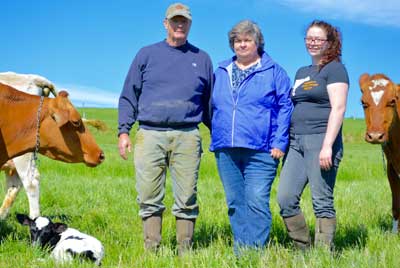 |
| Left to right: Vaughn, Laura and Brooke Chase with a few of their cows, including a newborn calf. The Chase family has been involved in dairy farming in Aroostook County for more than 60 years. |
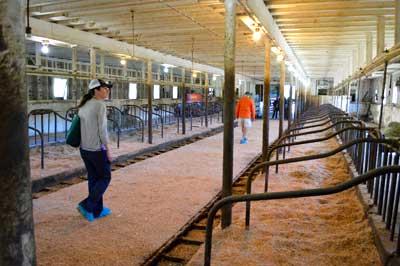 |
| Inside the barn at Chase’s. |
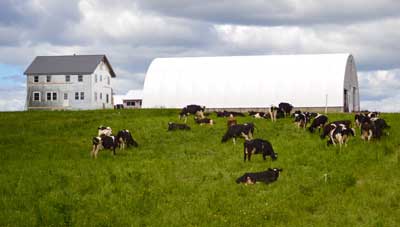 |
| Esch Family Farm is a new, progressive organic dairy farm in Smyrna. |
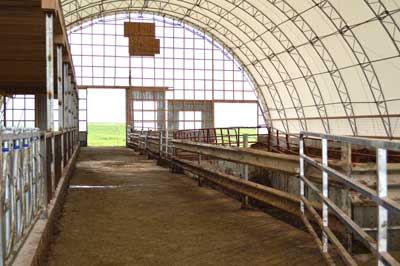 |
| The modern, well ventilated, naturally lit barn at the Esch farm. |
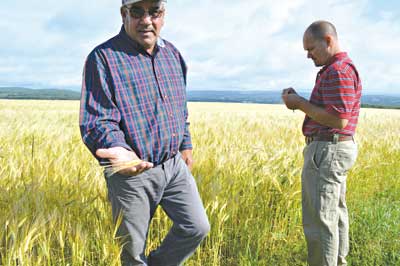 |
| Marquis Farms rotates organic grains (here, barley) to break insect and disease cycles in its potato crops. Shown here: Wayne Marquis (left) and John Chartier. |
By John Chartier, MOFGA agricultural specialist for Aroostook County, and Jean English
Photos by Jean English
Dairy farming has a long, rich history in Aroostook County. According to Clarence Day in “Farming in Maine 1860-1940,” A. P. Bennett of the town of Linneus built the first butter factory in Maine in 1878, and Fort Fairfield, Presque Isle and Houlton each had cheese factories in the late 1800s. Houlton and Presque Isle later constructed their own successful butter factories, largely because southern Aroostook County had a successful dairy and cattle market.
The Aroostook dairy industry has had its ups and downs since then. Over the past few years, MOFGA and Organic Valley (OV) have been working together to build those ups.
Consumer demand is a strong driver, too – demand for the nutritional benefits of dairy products coming from grass-fed cows and for products from cows not treated with synthetic growth hormones or fed conventional grains. According to the Organic Trade Association’s (OTA) 2016 and 2017 Organic Industry Surveys, dairy, the second biggest organic food category after produce in terms of sales, accounted for $6 billion in sales in 2015, an increase over 2014 sales of more than 10 percent, and for $6.4 billion in 2016, up 6.2 percent over 2015. In 2015, dairy accounted for 15 percent of total U.S. organic food sales. In 2016, 8 percent of all dairy products bought by U.S. consumers were organic.
Those increases could have been even greater. The OTA says, “Dairy and grains were two areas where growth could have been even more robust in 2015 if greater supply had been available. There is an industry-wide understanding of the need to build a secure supply chain that can support demand. This goes hand-in-hand with securing more organic acreage, developing programs to help farmers transition to organic, and encouraging new farmers to farm organically.”
Dairy farmers seeking the increased pay from organic (about twice the rate paid for conventional milk) and the price stability of organic are another driver.
Organic Valley, a cooperative owned by about 2,000 farmers in 36 states, produces a variety of organic foods, including milk, eggs, meat and produce. Its Maine farmer-members have a longstanding interest in growing the organic dairy and grain industries on the relatively abundant and inexpensive farmland in Aroostook County. About 50,000 to 75,000 acres of farmland are underutilized there and could be developed. Another 125,000 to 150,000 acres are in farm production and could be developed in the future should the organic system be more profitable than the current potato/grain production.
In June 2017 a few dozen MOFGA, Maine Farmland Trust and Slow Money Maine personnel as well as MOFGA supporters toured Aroostook County to understand the broad potential to rebuild the organic dairy and associated grain industry there. The tour was hosted by MOFGA and funded through a grant from the Maine Community Foundation. Participants looked at opportunities for new dairy farmers, for those raising feed, and for incorporating feed grains into potato rotations.
The quality of crops and soils and the enthusiasm of the farmers on the several successful organic farms toured inspired the visitors. The participating farmers expressed different reasons for becoming certified organic initially – some, frankly, for the added premium that organic brings; some for philosophical reasons – but all said they ultimately came to believe in the organic philosophy as their crops and animals thrived under organic systems.
“I have never been as excited about farming as in the last seven or eight years, and it’s because of organic,” said potato and grain farmer Wayne Marquis of Marquis Farms in Van Buren (profiled in the winter 2015-2016 issue of The Maine Organic Farmer & Gardener).
Likewise, Mapleton dairy farmer Vaughn Chase said, “My family and I wouldn’t be farming today if it weren’t for the opportunities that being organic has provided.”
The Aroostook dairy farmers’ enthusiasm is especially critical, given the time and costs involved in trucking from The County to processing plants, and the need for a certain amount of milk to make that trucking work. The enthusiasm, cooperation and support of the existing Aroostook dairy farmers is essential as the catalyst to further development of Aroostook dairy.
The Aroostook Initiative
In 2011, OV had 31 Maine farm members. That summer I (John Chartier) toured Aroostook with Steve Getz, pool manager for OV’s New England East Region, to explore the opportunity for dairy and related development there. We identified several areas with abundant available land, such as Easton, Patten/Sherman and Perham, where dairy clusters could be developed for the most efficient trucking route from the initial farms. The potential exists for developing two or three loads of milk without venturing much north of Caribou. Each truckload needs about 500 cows, and each cow needs about 5 acres for grazing, winter forage and grain production, so this effort could require about 7,500 acres.
After our 2011 tour, OV CEO George Siemon visited and was similarly impressed with the quality of soil and the attitudes of farmers. Aroostook County seemed like a place where bringing a market such as OV could have a huge impact on farms and communities. The Amish in The County were also among those interested in producing organic milk and crops. In the summer of 2014, OV developed The Aroostook Initiative. In this cooperative initiative, OV would commit to trucking milk from Aroostook to the Stonyfield processing plant in New Hampshire if Maine members of OV provided some financial support as well, and if the new organic dairies in Aroostook would help with the extra cost of hauling. The OV board approved the project.
In a related development, MOO Milk (Maine’s Own Organic Milk), a collaborative enterprise that had started in 2010, had closed in 2014 when equipment that put its milk into cartons failed. Organic Valley signed up six of the former MOO Milk producers – including two from Aroostook: Chase’s Organic Dairy in Mapleton and H.B. Farms in Woodland. Its trucks began rolling in Aroostook in 2014, and OV and MOFGA continue working to further dairy development there.
Thanks to the initiative and ongoing efforts by OV and MOFGA, by the summer of 2017, 12 OV member farms were shipping over 30,000 pounds of milk every other day from Aroostook, one more new farm had an agreement to ship, 12 additional farms qualified to join, and OV was working with four Amish communities to further the industry. In all, 47 Maine farm families are part of OV now. Currently three trucks run every other day from Maine.
Examples New and Seasoned
The two dairy farms on the 2017 MOFGA tour highlight the enduring values and opportunities of raising cows in Aroostook County, on the one hand, and the new enthusiasm and young energy, on the other.
Chase’s Organic Dairy in Mapleton has about 100 cows, mostly red and white Holsteins with a few Jerseys and black and white Holsteins mixed in. The family milks about 60 cows, on average.
Lewis Fraser Chase started the farm in 1935 at age 20, and in 1955 he added milking cows. His son Donald later took over the farm, followed by his other son, Vaughn, and Vaughn’s wife, Laura. Everyone in Vaughn and Laura’s family, including all four of their children, helps care for the land and the cows. Daughter Brooke, a pre-veterinary student at UMaine, was on hand when we visited.
The cows – each known by name – are rotated among paddocks within the 600-acre farm, about 330 acres of which are in pasture or hay. Underground pipes bring water to tubs in each paddock so that cows don’t have to travel far to drink. Twin calves had been born minutes before our tour arrived in June, and all tour participants were captivated as several cows surrounded and tended one of the newborns until it was able to stand. The same care was apparent as the Chases gently interacted with the cows – and vice versa.
Certified organic since 2006, the farm received the 2008 Central Aroostook Soil and Water Conservation District Outstanding Conservation Farm award.
Vaughn Chase is helping ensure that another generation can become dairy farmers – not just by teaching and employing his own children; he is also an advisor to the organic dairy farmer training program at Wolfe’s Neck Farm in Freeport.
Toby Esch and his wife and their Esch Family Farm are part of the new, young dairy farmer population in Aroostook. They live among about 20 Amish families in Smyrna. Their new home and bedded pack in a hoop barn, their contentedly grazing Holsteins and spotless milking facility highlighted the cautious but optimistic energy for organic dairying in Aroostook. Contrary to some perceptions about the Amish, this young farmer is using some of the latest systems for best practices in animal comfort, milking and manure handling, which are good for the cattle, farmer and environment. It’s truly a model farm and example that will be replicated.
Other projects vital for dairy to be successful in Aroostook are also in place or progressing. Marquis Farms, for example, sells potatoes, straw and hay, and is rotating legumes, oats, barley, wheat and rye with potatoes. The organic grains are currently sold for cattle feed. Potatoes are the most profitable crop for Marquis Farms, but the rotated grains pay their way by helping break potato insect and disease cycles.
About 400 acres of grain grown in Aroostook were fed to Aroostook dairy cows last year. More grains are being grown in Aroostook for human consumption as well. In 2013, three Aroostook grain farmers grew 325 acres; in 2016, 12 farmers raised grain on 1,115 acres.
Adding to this potential, the Skowhegan-based Maine Grain Alliance has received a $50,000 grant from the Maine Technology Institute to inventory grain drying and storage systems on farms in Aroostook County, to determine the capacity for scaling up grain growing and drying in Aroostook for food and animal feed, to research drying and storing technology and to research financing options to improve drying and storage.
The long, rich history of farming in Aroostook continues.
